SOCIAL MEDIA MARKETING WITH THANASI PAPOULIAS | E003 PODCAST
LISTEN TO THIS EPISODE ON ALL STREAMING SERVICES
ABOUT THE GUEST
Thanasi Papoulias sits down with George Stroumboulis to discuss the business of Social Media.
Thanasi Papoulias is the Founder of Strategic Instinct – an integrated media firm helping clients in the arena of social media, branding, online reputation, influencing and analytics. Thanasi helps his clients create connections with their consumers through viral campaigns and growing their online presence.
With early success in the startup arena, Thanasi built an automotive community online and then sold it to a larger media company. Paving the way into a career in Real Estate investments and Theater development. It was his passion for his culture that made him start a brand focusing on Greek content called – Excuse Me Are You Greek? With a collective following of over 100,000 people around the world, Thanasi turned his passion into a revenue generating venture.
With his Bachelors in Economics and his MBA from Pepperdine, Thanasi has created a very diverse background throughout his career so far. To stay connected with him, see the links below.
AGENCY WEBSITE: https://www.strategic-instinct.com/
WEBSITE: http://www.excusemeareyougreek.com/
LINKEDIN: https://www.linkedin.com/in/tpapoulias
TWITTER: https://twitter.com/EMAYGreek
INSTAGRAM: https://www.instagram.com/excusemeareyougreek/
FACEBOOK: https://www.facebook.com/ExcuseMeAreYouGreek/
CONTACT: http://www.excusemeareyougreek.com/our-story/
“My biggest thing and the most important thing I think is consistency. Find whatever you’re comfortable with and try to stick to it. Don’t post five photos in one day and then disappear for a month or even a week, you know, spread it out, try to stay consistent because believe it or not followers get into a habit of how often they see your content.”
MEDIA RELATED TO THE EPISODE
George Stroumboulis discussing with Thanasi Papoulias about early business startup life at the studio in Newport Beach, California.
Thanasi explaining how he invested his money following the sale of his first startup.
George and Thanasi chatting in the 'Invigorate Your Business’ studio in Newport Beach, California.
ABOUT THE “INVIGORATE YOUR BUSINESS” PODCAST
The Invigorate Your Business with George Stroumboulis podcast features casual conversations and personal interviews with business leaders in their respective fields of expertise. Crossing several industry types and personal backgrounds, George sits down with inspiring people to discuss their business, how they got into that business, their path to the top of their game and the trials and tribulations experienced along the way. We want you to get inspired, motivated, and then apply any advice to your personal and professional lives. If there is at least one piece of advice that resonates with you after listening, then this podcast is a success. New episodes weekly. Stream our show on Spotify, YouTube, Apple, Amazon and all other platforms.
ABOUT GEORGE STROUMBOULIS
George Stroumboulis is an entrepreneur to the core, having launched several ventures across multiple industries and international markets. He has held senior-level positions at progressive companies and government institutions, both domestically and internationally, building an extensive portfolio of business know-how over the years and driving profit-generating results. George’s ability to drive real change has landed him in several media outlets, including the front page of the Wall Street Journal. George was born in Toronto, Canada to his Greek immigrant parents. Family first. Flying over 300,000 miles a year around the world puts into perspective how important family is to George’s mental and emotional development. With all this travel to global destinations, the longest he stays even in the most far-out destination is 3 days or less - a personal rule he lives by to make sure he is present and involved in family life with his wife and three daughters. To read about George’s global travels, stay connected with his blog section.
STAY CONNECTED WITH GEORGE STROUMBOULIS
STREAM & LISTEN TO THE PODCAST:
SPOTIFY: https://open.spotify.com/show/1rW2CmxQoiJNEPOZupJlvd
YOUTUBE: https://www.youtube.com/user/Stroumboulis
APPLE iTUNES: https://podcasts.apple.com/us/podcast/invigorate-your-business-with-george-stroumboulis/id1607693240
AMAZON MUSIC: https://music.amazon.com/podcasts/8fc03929-71b3-483a-a64e-153e30b3d462/invigorate-your-business-with-george-stroumboulis
iHEARTRADIO: https://www.iheart.com/podcast/269-invigorate-your-business-w-92187370/
STROUMBOULIS SITE: https://www.stroumboulis.com/podcast
OTHER SERVICES: GOOGLE, PANDORA, OVERCAST, CASTRO, CASTBOX, PODFRIEND, PLAYER.FM, PODCASTADDICT, PODCHASER, PODCASTINDEX and RSS FEED.
FOLLOW GEORGE STROUMBOULIS:
INSTAGRAM: https://www.instagram.com/georgestroumboulis/
YOUTUBE: https://www.youtube.com/user/Stroumboulis
LINKEDIN: https://www.linkedin.com/in/Stroumboulis/
TWITTER: https://twitter.com/Stroumboulis
FACEBOOK: https://www.facebook.com/georgestroumboulis
TIKTOK: https://www.tiktok.com/@georgestroumboulis
CONTACT GEORGE DIRECTLY: https://www.stroumboulis.com/connect
FULL SHOW TRANSCRIPT
George Stroumboulis: Today I sit down with a social media expert that helps his clients create viral content. In this episode I sit down with Thanasi Papoulias, founder of Strategic Instinct - in the Business of Social Media Marketing.
George Stroumboulis: So, essentially, we're going to start this. I'm excited to have you sit down with me today, first time on cameras but usually it's just kafidaki. And, you know, we want to jump into this and just talk about a lot of stuff Thanasi Papoulias. I don't even know how to introduce him because he's very entrepreneurial; he has an executive corporate background and is able to apply that to a lot of different things. So, welcome and thank you for being on the show.
Thanasi Papoulias: Thanks for having me, George.
George Stroumboulis: Absolutely.
Thanasi Papoulias: It's always good.
George Stroumboulis: Absolutely. So, Thanasi, we know each other, we met mutual friends at an event in Toronto, both receiving a little award, and then ever since then we just gravitated to talk business and so on. And then I was honored to baptize your daughter which is awesome. But talk to me, go back to what do you do when you introduce yourself, like what is it that Thanasi does?
Thanasi Papoulias: You know, it's a good question because it's never been the same, it's always been changing. And I kind of, I struggle to find what my identity is as to that question, like what do I do? I don't know. Right now what I do is, I just consider myself a digital marketer, you know, I’ve had a background with the blog site, you know, Instagram page, excuse me are you Greek, so I’ve had a lot of experience, you know, trying to build that kind of the side of a business up. And I’ve taken that on full board now. So I do it for others, you know, specializing in restaurants. So, yeah, I would say I’m a digital marketer, right? This would be the best description at this point in time but who knows, you know.
George Stroumboulis: Absolutely.
Thanasi Papoulias: In a few years it could change.
George Stroumboulis: So, the first time I met you we were talking about your success story and actually the first time we met after Toronto was we went to Korean barbecue and you were telling me about it.
Thanasi Papoulias: That’s right.
George Stroumboulis: Yeah, and you were telling me what you did when the internet wasn't really mainstream enough. Can you talk about that startup because that was initial success to build a business up get a following and then sell it to a large buyer?
Thanasi Papoulias: Yeah, absolutely. So, back in college and I’ll date myself now, so UC Irvine 96 to 2000, a good friend of mine George, Christie’s and I started a website design and development company, building websites for people that didn't know how to build websites, you know, this was the wild west of the internet, let's say…
George Stroumboulis: What year are we talking roughly?
Thanasi Papoulias: This was 96, 97. So, right away, like right when we got into college we wanted to, you know, make some money obviously on the side while we're studying. So, we made omega team web development. Now we didn't have a lot of clients but what I did notice is I had just purchased the Volkswagen Passat, and I was envious at all the websites dedicated to like ford mustangs and, you know, the hot cars that people always want to talk about, there were a ton of websites, right? And at the time even for Volkswagens, there were larger sites that dealt with, you know, a vast majority of other Volkswagens not the Passat. So, I took it upon myself just to create a Passat website. And I told myself okay, so what's the most important thing. Do I want to read what other people want to tell me or do I want to read from a community? So that's where the idea of a discussion forum application came in.
George Stroumboulis: Let me ask you there. Even when you had this idea, the word term monetization wasn't a thing back then.
Thanasi Papoulias: No.
George Stroumboulis: Did you think going in I’m going to do this to make money or was it a passion like how did you approach that?
Thanasi Papoulias: Every project I’ve ever done has never been with monetization first. It's always in the back of my mind thinking, you know, that would be cool one day to monetize it but I feel like if you're going to structure something around monetizing it, it's not going to come out the way it needs to be.
George Stroumboulis: Absolutely.
Thanasi Papoulias: So, it's always a passion project, it's something I love, it's something I enjoy doing. So, before you knew it, you know, million hits a day, you know, people all over the world, you know, just… I would be in Greece actually, I was in Tripoli, in Athens and people were recognizing me because of that website so… And this is just the Passat; we're not even talking all Volkswagen, the Volkswagen Passat.
George Stroumboulis: So, late 90s you start this website, you're getting hits, you created a forum, millions of people logging in every month to read this to do that, back when it wasn't very mainstream. What happened next because this is pretty awesome?
Thanasi Papoulias: Well, we built it up. And it's kind of like the Facebook model, right? I decided we need to give people profiles. People love showing off their stuff. So, we created the profile section and the discussion forum section. It takes off, it's, you know, mid to late early 2000s, right? 2006, 2007, iPhone comes out and you start seeing social media start ticking upwards. And I’m like hmm; do I want to take it to that level? Is it time to sell? I didn't have the energy to build it up again on a new platform, so…
George Stroumboulis: What was the name of this platform at the time?
Thanasi Papoulias: Passatworld.com.
George Stroumboulis: Okay, dot com.
Thanasi Papoulias: Passatworld.com. So, it changed from club b5, the b5 was the platform of the car I had. And then when the new one came out the b6, you know, we decided to just rebrand our Passat World; we brought in all the old Passat and then future Passat. So, it was more just to accommodate more levels of Passat essentially.
George Stroumboulis: Okay. So, you get it to this point; sell it, acquisition, like what was going on?
Thanasi Papoulias: There were no thoughts. There was just me being nervous about what the future was and what do I want to do. I mean at the time I had started a new position in real estate as a project manager for a development company and this was on the side making money, you know, through advertisers and so forth. But, it wasn't, the passion wasn't there because I didn't have a Passat anymore, you know, I got into an SUV. And out of the blue I would just receive an offer, it was kind of like a cold offer, we got an email and this part of the story is great because I still don't believe what happened that it actually happened. So, they sent me an email; I’m like yeah, these guys are probably joking, you know, they're not serious.
George Stroumboulis: Nigerian Prince needs 14 million.
Thanasi Papoulias: I mean, you know, that's always in the back of your mind, right? So, I asked them for more information, come to find out it is, I forget the entity but it's the entity that owned auto guide which is the magazine that you'd see at all the newspaper racks and grocery stores. So, they make me an offer. And now I know they're kind of serious, right? And I’m like okay, that's interesting. What do I do with this? Is this a good offer? How do you evaluate an internet company that just is a discussion forum advertising based company? I had no idea.
George Stroumboulis: And were there resources online, like there were today to even have no benchmarks.
Thanasi Papoulias: No, I mean, you know, everything you would read just pulls from the three or four or five multiplier, you know, I don't know, I felt like the potential is there. And, you know, the way Google advertising works and Facebook advertising works, the larger you can make your network the more profitable it is for you. So, if I have the one website generating a million hits a day that's great but if you have 10 of those, you're making more per view than I am because of the vast network. So with that knowledge I’m like okay, so this website is worth more to them than it is to me and I was happy with the price.
George Stroumboulis: You recognized that at that point.
Thanasi Papoulias: Yeah. And I still have these emails; they're starred in my Gmail folder…
George Stroumboulis: No way.
Thanasi Papoulias: Because I pull it up when people don't believe me. So, my response to them was, no thank you, I’m already in talks with someone else. But, thank you for your offer, it's truly appreciated. And just shine them off. Three days later, come back, they've doubled the offer now. And I’m like okay, yes, yes, yes… but obviously you don't want to panic, right?
George Stroumboulis: Kind of like a dating life.
Thanasi Papoulias: Right. I’m like, okay, well you guys made it interesting now, let's talk a little bit. I didn't tell him I was interested yet, dragged it on for a few weeks and before you knew it, now I, you know, sold the website.
George Stroumboulis: 2X on whatever they were asking you before.
Thanasi Papoulias: Yeah.
George Stroumboulis: That's amazing. And then at that point what do you do with that money? Because first of all that's just a success to be passionate about something. We're going to get into your social platform now, excuse me are you Greek, which again started with passion and now it's become this huge platform, tens of thousands of followers around the world. But what did you do at that point? So, you came into some money, you're dating, engaged, no kids.
Thanasi Papoulias: No kids.
George Stroumboulis: So what was your thought process? And who guided you if anyone on what to do with that money?
Thanasi Papoulias: You know my Nuno did because he's a successful businessman. So, I remember I was working for him at the time and I asked him what his thoughts were on this. But not what should I do with the money, it's just what do I need to do, you know, like what's the broader vision. And, you know, he reminded me about real estate which was also my background, my family's background. And I didn't touch a penny of it, not one penny. I took it all went and bought at the perfect time. I mean we're talking now the crash was in O8 and I bought in 2010, when I sold my website that same year.
George Stroumboulis: Amazing! And you took everything. Was that a hard decision? Because you're setting yourself up for the future but at that time like let me just pull out this and go to Mykonos for a few days.
Thanasi Papoulias: It was tempting but I don't think I’ve ever been that person where I feel like I need to just indulge in anything, you know, I’m pretty content with just living a normal kind of mainstream life, you know. So, I didn't have that urge but it was tempting because I’m like wow, I can buy a new computer, I can do this but I’m like do I need it? I don't need it right now. So, I looked at this investment, the opportunity came up, I’m like you know what, move it, moved it all, bought the property, the deal was even more amazing because we got the owner to carry, so it's like it wasn't even on the books, it wasn't like, you know, no loan, I mean there was a loan but obviously not through a bank. And let's put it this way, I refinanced recently at around the same rate which were historically low now, at the same rate I had it at. So, I had a low rate even during the times like when it was super high.
George Stroumboulis: Those are smart moves to do, you know, and leading into. So, talking about it, talk about your industry, corporate, c-level executive in the cinema space, right?
Thanasi Papoulias: Yeah.
George Stroumboulis: Theater space, here in Asia you've done some stuff. Walk us through how you got into that and then we'll talk into the social side of it.
Thanasi Papoulias: Sure. Well, I already mentioned my Nuno, so he was in the cinema industry. And growing up I always loved, you know, the weekend, he would take me…
George Stroumboulis: Sorry. By the way Nuno is his godfather.
Thanasi Papoulias: Yes, my god father.
George Stroumboulis: Non Greeks listening to this, right?
Thanasi Papoulias: There we go. So, he brought me into the industry, you know, growing up whenever I was out of his house, we'd go visit his theaters and he'd stick me in an auditorium, I’d watch movies all day, I thought it was heaven. So, there was always this fascination in the background with movie theaters. And when the real estate industry crashed in 2008, that's the industry I was in, there was an opportunity he's like hey, if you want a position I have a position for you, so made that transition. And, you know, when you're at a certain level of being an executive, it can kind of translate to different industries. And the cinema industry is very unique but it wasn't too difficult to grasp. So, I grasped it fairly quickly and before you know it we're in china, trying to make deals to open movie theaters in china also.
George Stroumboulis: In china. So how does that even work from getting the rights to movies like just going over there?
Thanasi Papoulias: Well, first of all you have to have a partnership with a Chinese Entity, they won't let you have a, you know, a 100 American-owned entity in china. So, we partnered with an organization, the second largest broadcasting organization over there. Created one of the first agreements, you know, of the kind at the time, especially for that industry. And before you know it were just negotiating, it really came down to investment because it was going to take a lot of money to make this happen, and there were a lot of nervous people with putting money into china. And rightfully so, you can't really blame them about it but we were trying to sell it like hey, this is us, you're investing in not that. But in the end, nothing ever happened in china. We couldn't find the investment, it is what it is, and it was a great learning lesson.
George Stroumboulis: Happens, everything happens, you know, there's a reason out there and in transitioning. So, the cinema you've had access, you go to all these festivals that go on and wherever they go, Salt Lake, where do these…
Thanasi Papoulias: Sundance.
George Stroumboulis: Sundance, all that. So, you have access to a lot of these Hollywood people. And is that still your passion even though you're not in that space? Are you obsessed with like movies?
Thanasi Papoulias: You know the movie industry has changed in general. I feel, well and that's like the music industry and everything else, right? And I don't feel the quality is what it used to be. So, I don't have the same passion as I did when I watched like the 80s movies, the 90s, the early 2000s. So to me it's not the same but I don't want to say I’m not passionate about it but also as you get older, the time you have is also becomes more limited when you have kids, side projects and your own company, so not as much time to watch movies, but the passion is not as much there. But I feel like getting into that industry was more about just the cinema industry too. Like, my passion was trying to change this dinosaur industry. I mean that was my biggest complaint to everybody was why are you guys doing the same thing you did 30, 40, 50 years ago. The industry like your model has not changed in so long, so…
George Stroumboulis: Well, talk to me on that though, age group, right? Your early 40s and you're sitting there with other executives who are 60s, 70s, like again not to be ageist in any way but you have these new ideas and if it isn’t broke, don't fix it. Well, COVID happens, and everything kind of broke, right, it just kind of shook up the industry.
Thanasi Papoulias: Broke is an understatement, I mean, movie theaters were the first group to close and the last to open. So, it was a tough cycle but eventually that's… when I made the decision like maybe it's just time to move on, I mean, I don't want to say like I was the only one, like my company was looking to downsize, so that's the conversation we had. And I accepted… the writing was on the wall, it wasn't a surprise. When I got the phone call I’m like this is it. And he's like, yeah, I go okay. And meanwhile I had been working on the marketing stuff on the side and…
George Stroumboulis: Well. So, this happens, there's a shakeup and you basically had some stuff and we'll touch into your platform but you went from executive big company, right? I’m going to start my own thing in the worst time in our modern day, our life for sure, oh wait didn't really affect me back then I was younger whatever, that takes some balls to even be able to do that not just try to find a secure job and get through this. What was that stress like? And not just you, it's a family affair, you have kids, and you have a wife…
Thanasi Papoulias: And that was the more stressful part, it's like okay, you know, you think about yourself growing up, your parents working and just providing it was a nine to five that whole aspect of just doing my own thing full time was very scary in itself. And then at the time it was happening was even scarier.
George Stroumboulis: Right. What was the scariest thing? Like what was your biggest fear when you're like I’m going to do this? Failure obviously, but what does failure look like to you if it didn't work out?
Thanasi Papoulias: You know, it sounds kind of… what's the word I’m looking for? It sounds kind of cliché but I didn't think about that because if I failed then, you know, I’m planning for failure, I didn't want to dedicate resources to failing, I wanted to dedicate resources to making things happen. But, what pushed me was like okay, well, I got to pay my mortgage next week, you know. Sure, we have investments and we were fine, like it wasn't a… I’m going to be homeless type of scared but I also didn't want to burn through savings at a young age. I didn't want to go through that whole process. And that was the motivation and I had already, you know, built up this knowledge of social media and of marketing, you know, that's all. My passion has always been marketing, you know, people when they hear marketing they think advertising, I would say, your average person. But when you dive into what marketing is, it's getting your product out to people, it's presenting it in a way that's going to be admired by customers then people are going to want it. So the way I always approach marketing is I put myself in the customer's position. So, even though I was the director of food and beverage at the cinema company that I was working at, I never approached it like I’m trying to push out food to them. I’m trying to come up with different ways to get food to the customer using apps. You know, we were one of the first companies to start pushing apps inside movie theaters to start ordering but…
George Stroumboulis: And the knowledge you have, by the way, like the economics of popcorn and soda and how that applies. Like, when we were talking about it, it blows my mind, right? Every business has their economics but down to the paper bags and how much the average person spends like data. You've always been data driven, marketing driven that experience. While you're doing all this, you have a passion pet project. Is what it started as excuse me are you Greek?
Thanasi Papoulias: Yes.
George Stroumboulis: And just walk us through that because it went from passion Greek culture are a big thing for both of us, right? Making fun of it, talking about it… first of all how did even the name come up excuse me are you Greek? And then now, you know, basically with all your platforms over 100000 followers and supporters on every part of this planet, it's pretty amazing from building it as fun to where you're at today.
Thanasi Papoulias: Well, first the name excuse me are you Greek, it was kind of like a joke we would always say, when we heard somebody speak in Greek or when you think someone's Greek because they got the evil eye on their shirt or something, you know. And you'd want to approach them because Greeks have this thing with wanting to identify with other Greeks. So we would always… that would be the line. Like, I’d walk up to people hey, excuse me, are you Greek? Oh yeah, I am, oh great, you know, then the conversation rolls into, where are you from in Greece and da, da, what's your name? So that's how the name came to be but the project itself again was a passion project, right?
George Stroumboulis: What year did you start?
Thanasi Papoulias: That was 2016. So, it's in its sixth year now. This summer will be six years. So in 2016, there were other, you know, meme pages out there, there were other sites out there but like the Volkswagen stuff, I looked at it, I’m like this is terrible, you know. It's cheesy, it's superficial, there's no thought put into it, you know, people just put up an image just for a quick joke. And I’m like, I don't like this content but I think there's so much potential there. So that's when I started coming up with what I thought was deeper content. And, you know, more thought into it. And I never reposted anybody's stuff. It was always my own content whereas all these other pages were just taking whatever funny stuff, sharing this, stealing that, copying this. I would make my own stuff.
George Stroumboulis: And while having an executive position, while having a family and just doing this…
Thanasi Papoulias: It was just fun in the corner; I would work on it once a week. Because when it was first starting out, it didn't need the attention it needs now. So, it was an easy thing to just do once a week lay out what I’m going to be posting. And I’d have that content ready to go for the whole week. So, I never really had to think about it on the day off. Before you know it grows into something bigger, and now I share a little bit, you know, I like to promote and highlight other Greeks and businesses and organizations. So that's the side of it that I actually love a lot and get passionate about.
George Stroumboulis: Yeah. And so this platform, there's a website from the blog aspect, there's the Instagram, there's the Facebook aspect, tick tock, whatever there is. From when you started it until today and today its successful, its revenue generating, you've monetized it, that's a six year window. When did you see this and say, you know what this has got potential people like what I’m saying, right? And then I can make money off this, right? And monetize my efforts. Like, when was that eureka moment for you like huh?
Thanasi Papoulias: Well, I remember this vividly, we went to Greece in 2017. That was the last time we went. And I remember I had 3,000 followers on Instagram in 2017. And it's up to like 82,000, just on Instagram.
George Stroumboulis: Let's get it to 2 hundred thousand.
Thanasi Papoulias: And I thought 3,000 was a lot, you know, but you're looking at it in modern day social media, you're like even 80, you can argue 80000 isn't even that big, you know, there's people with 3, 4 million followers but the type of, the quality of followers is key.
George Stroumboulis: The quality and then you're in a niche Greek related, so you're Italian, you're, you know, it's very niche and that's a big following.
Thanasi Papoulias: Sure.
George Stroumboulis: And then how many countries? There's got to be over 40 countries of…
Thanasi Papoulias: Oh easily.
George Stroumboulis: Easily.
Thanasi Papoulias: Easily, yeah. I mean there's a follower that always reaches out to me from Brazil and he's like, oh yeah, we have that in Brazil too. Yeah, there's a lot of Greeks in Germany, believe it or not. And I’m only talking about the not so obvious ones. We know Australia has a ton of Greeks, Canada has a ton of Greeks, the US has a lot of Greeks, Germany is close, you know…
George Stroumboulis: What about Zimbabwe?
Thanasi Papoulias: Nigeria.
George Stroumboulis: Nigeria.
Thanasi Papoulias: Nigeria, there's three followers that are consistently posting and commenting.
George Stroumboulis: Get out of here. So, okay, when was that moment though 2017 you're in Greece with your family 3,000 followers.
Thanasi Papoulias: So that was my first aha moment like hey, this could potentially be something but what is it. Do I want it to be a bulletin board of advertisements? No. Like, I knew from the very beginning, I didn't want to do that. That was kind of like my first; let me start thinking about this. So, over the course of 2017, 2018, I started saying okay, well, I guess I can adopt that influencer role even though like I hear the word influence and I kind of cringe.
George Stroumboulis: You cringe. What do you associate? When I hear influencer, I think beautiful model, selling a tea product, repost it, I don't really use that but the influencer you become that because…
Thanasi Papoulias: Well, the part that makes me cringe is the superficial aspect of it, right? Like is this influencer really consuming all those products that they're highlighting and showing off, so that's my cringe with it. Not what they're doing because more power to them. Whoever can make money doing what you like, I’m all for it.
George Stroumboulis: Absolutely.
Thanasi Papoulias: So, it was adopting that kind of role that made me cringe. I’m like I don't want to be that person, like go eat at this place, go do this, go, oh this Greek products, the best Greek product, I didn't want to be that person. So, I turned down a lot of advertising opportunities because a, I either didn't believe in the product or b, I would never use it and I didn't want to be the person to say go use this product and… Oh yeah, by the way, I don't touch it, I’ve never used it, I never wanted to get caught up in that.
George Stroumboulis: Absolutely.
Thanasi Papoulias: Right?
George Stroumboulis: Which by the way, just a side note, there's people even in our circles even back home when content's reshared like in a story and you'll reshare, it's talked about like we were shared on this page, like, it's become in our community a big thing. So you have that moment, how do you then take this and say look I’m monetizing, you're staying away from certain brands, right? Because you don't want to alienate your page; and then you say look, I need to now apply this back, I’m an executive in the country, how do I now do what I’ve done for myself for other companies, and enter strategic instinct which you launched during the shittiest time, right?
Thanasi Papoulias: During the pandemic.
George Stroumboulis: During the pandemic. And instantly people are like Fanasi’s starting, let me latch on, let me latch on, it's pretty remarkable start. So, transition us into that and what you're working on.
Thanasi Papoulias: Sure. So, obviously growing my own stuff over six years, I kind of know what the recipe is. And that recipe is changing; don't think it's the same from 2016 to 2021, a lot's changed over that time. But, like I said I always look at it from a customer's point of view, and I feel like that's what separates me. I’m not just trying to create cool content. Anybody can create cool content. It's trying to find how do you engage with your audience and what's that messaging.
George Stroumboulis: Absolutely.
Thanasi Papoulias: If you're just throwing out there, hey, we have the best food or we have the best sandwich, nobody's care…
George Stroumboulis: Or the best lighting there's…
Thanasi Papoulias: There's noise, you know, nobody cares, you're just another, you know, blurb that they're reading that they're annoyed with. Like, okay, yeah, you have the best sandwiches. Great, move on. I like to approach it from the sense of how are you making somebody's life easier. So, yeah, we have the best heroes at one of my client’s restaurants. But, we don't really say that. We say it more like hey, you can get these in a family pack and you don't have to worry about dinner tonight.
George Stroumboulis: So, you're talking about the solution…
Thanasi Papoulias: The solution to a potential problem but by the way the ingredients are the freshest, you know, ingredients and you try to sprinkle that in but I don't lead with it. So, you know, I took that opportunity of everything I’ve learned from excuse me are you Greek, I parlayed into strategic instinct which is my marketing company now. And so that's where I’m at.
George Stroumboulis: So for more information though on strategic instinct dot com?
Thanasi Papoulias: Strategic-instinct.com
George Stroumboulis: And we'll put the links up, everything…
Thanasi Papoulias: That'd be great.
George Stroumboulis: But it and it's not just food. Like, you're getting into the real estate industry into the lighting space and helping a bunch of different clients. And people should understand it's not just a post on an Instagram story and that's the work. It's like you said the strategy. Give our people some advice. Like, if I’m a new restaurant or I’m trying to sell myself from a real estate standpoint or I’m trying to self-promote myself, looking at the marketing umbrella and we're looking at the social, how should people approach that. Is it simple as Instagram and I’m there, you know, should they have their own website, what are some platforms we should do.
Thanasi Papoulias: Well, I’ll start off by saying this, something is better than nothing because a lot of people are hesitant to even start because I think it's a lot of time. Something is better than nothing because the first thing I do and I think the first thing most younger generations, millennials, gen z, they go look you up when they hear about you. It's no more like who is this company, let me talk to my friend, let me go look them up, it's like let me go to their Instagram page, let me, oh they don't have an Instagram page, do I want to dig through Facebook and try to find them. I think that platform is shrinking significantly now.
George Stroumboulis: For an age group or in general?
Thanasi Papoulias: I think in general because I was an avid Facebook consumer back in the day. I haven't been on it in a week other than posting stuff for my clients.
George Stroumboulis: I’ll be honest, maybe every two, I don't consume anymore, maybe it's like what posts are going on, and it’s just irrelevant to me throughout my life.
Thanasi Papoulias: Like, there's more stress on Facebook than there is not. So, it's like I don't know, I don't want to deal with it.
George Stroumboulis: I’ll post there once every four months just for my family in Greece or my mother or whatever. That's about it.
Thanasi Papoulias: Yeah exactly. But that leads me into each platform is unique, each platform has a different consumer. What you're posting on Instagram sometimes you can post on tick tock and vice versa but I wouldn't advise on posting the same exact thing over and over. But that's really what it is, just start. And then find out some, if you're a national chain you need to be everywhere, if you're a local guy just start with Instagram. Instagram is a great start. Even though now it's not the easiest to grow on Instagram because they suppress your natural engagement, you know your organic growth I should say. Tick Tock right now and LinkedIn are the top two providers of organic growth to people. So, if you want to get your word out and grow rapidly with the least amount of work, I’m not saying no work or little work, just the least amount of work, it would be tick tock and LinkedIn right now. They're looking for it.
George Stroumboulis: And then Snap Chat’s just gone away? Like, what do you…?
Thanasi Papoulias: Snap Chat, I think is not, I don't want to say it's not relevant. Every platform has it, you know, relevance in a certain category and a certain demographic. For restaurants I don't see snap chat as important. If you have the resources I would do as much as possible. But again, it's time, its resources, if you do it yourself it's your time, you're taken away from growing your business, do you want to do snap chat or is Instagram, Facebook good enough. But, if you hire someone else, again the more platforms you're on the more expensive, it's going to be too.
George Stroumboulis: So you have to manage that, right.
Thanasi Papoulias: So, I feel like, you know, right now Snap Chat doesn't have anybody unique there. Like, if you cover tick tock and Instagram, you're covering the same people that are on snap chat. That's the way I view it, and if not all of them, 90 percent of them. So how much more work does you have to do to try to capture that extra 10 percent and are it worth it.
George Stroumboulis: Is it worth it.
Thanasi Papoulias: Right.
George Stroumboulis: So of all the stuff you've done in, you have clients one-off location and then there's local chains and then you have national and clients international actually in different countries, right? When you start surveying someone who wants to start working with you socially, what are some mistakes when you go to their profiles they're social? What are stuff that you see and you're like oh my god cringe worthy that our listeners can learn from, you know, is there a list hey, these are the three things don't do, you know, or do more of.
Thanasi Papoulias: Yeah. I think the quality of content is a key, is important, right?
George Stroumboulis: And what does quality mean to you?
Thanasi Papoulias: Yeah, no, and that's what I’m getting into. So, you'll see photos of food for a restaurant client that just doesn't look appetizing. It might be the way they serve it. And I’m not saying, you know, dress it up so it's not even recognizable. But you got to pay a little extra attention to the stuff you're going to post on social media because that's going to end up everywhere, it's going to end up on Google, it's going to end up on yelp, it's going to end up everywhere. So, the quality of content, just try put a little more effort than just having your cook make a plate and give it to you and go take a picture of it, you know. Just clean it up a little bit, put it in an environment that looks good, you know, dress the table a little bit, put a drink on, you know, show things that you do indirectly. You know, if you put a bottle of beer in the back, now people automatically know you have alcohol there and you don't have to write it anywhere, they just automatically see it. So you're communicating without saying anything. So, maybe you want the food piece to be the star but again if you put that bottle of beer in the background, you're telling them you serve alcohol, you know.
George Stroumboulis: Margins go up.
Thanasi Papoulias: Right. Yeah, you know, the kind of container you use, tells them what kind of establishment you are, you fast casual or you find dining. And you want to make sure you give off the right vibe, you don't want to dress it up too much where it looks like fine dining and they walk in and it's fast casual and, you know, you don't want to do that either.
George Stroumboulis: Quality, so for sure the quality aspect.
Thanasi Papoulias: Yeah.
George Stroumboulis: So, when you go to the page, poor quality, obvious red flag.
Thanasi Papoulias: That's a huge red flag.
George Stroumboulis: You know the amount of followers, right? And then are people even buying fake ones, people do that 101 and it's like don't do that, you're messing up the algorithm, you know, like...
Thanasi Papoulias: So that, let's dive into that next. Definitely the followers but I also want to touch up at one point about consistency.
George Stroumboulis: Okay.
Thanasi Papoulias: But the followers first.
George Stroumboulis: And then your fame on the food network that you had with one of your clients and creating, I want to make sure we touch upon that.
Thanasi Papoulias: So, first the followers. Yeah, you look at somebody they have 500 followers versus 50000, 50000 looks greater. But what's your goal? Do you want to communicate with people? Do you want to brand yourself? 50000 looks great but when you start trying to get your message out, you is going to struggle because that algorithm is going to see 50000 followers. And if only five people liking each photo, the algorithm thinks your content is horrible. And it's not going to push it out to anybody.
George Stroumboulis: Right. Or it's screaming those were purchased followers, right?
Thanasi Papoulias: Exactly. So that's why we recommend work with local influencers, you know. They're going to push real people to your page and that's where the good content comes in because nobody's going to follow you if you have crap content.
George Stroumboulis: Right. That's a great point.
Thanasi Papoulias: I would say, you know, post once a week something nice than trying to post every day something crappy.
George Stroumboulis: That's great advice.
Thanasi Papoulias: There's more value in having better content. And if you have the time to post something every day for a week then you have the time to just post one photo, make it up a little nicer and just do it once a week.
George Stroumboulis: Absolutely. So let me ask you on that point. You'll see stuff on social media, someone has a hundred thousand followers and there's a hundred likes, is there a rule of thumb on different platforms that typically X-percent will engage and most people are just viewing and moving on. Because then you have the LinkedIn of the world and that just seems too inflated sometimes. Like, where photos are posted literally 17000 views and you're like…
Thanasi Papoulias: But that's going back to what I was saying about LinkedIn being the wild west of organic growth right now. LinkedIn pushes out good content a lot. So, it comes back to that whole follower thing, right? If you have a hundred followers and 50 of your followers liking and commenting because your content is so good, the algorithms are going to pick up on that and feed it to other people. That's what I love about tick tock and LinkedIn right now is they have the For You page and the suggested posts. Whereas on Instagram it's who you're following and that's it, you're not going to get new content unless you go look for it or you see it from an influencer or something but… So, it's not inflated, it's accurate and that's why I’m pushing LinkedIn and tick tock for a lot of, especially B2B people. If you're in the B2B business, LinkedIn and tick tock right now, I mean you hear tick tock and you're like wait teenagers dancing but it's so much more than that.
George Stroumboulis: So much more than that. So, then when we're asking about red flags or how to improve their page. So, first one's quality, next one is the followers we talked about. Is there anything else that people in general before they even try to hire someone should do or not do in building their profile
Thanasi Papoulias: My biggest thing and the most important thing I think is consistency. Find whatever you're comfortable with and try to stick to it. Don't post five photos in one day and then disappear for a month or even a week, you know, spread it out, try to stay consistent because believe it or not followers get into a habit of how often they see your content. And if you post everything too quickly some people might not see something because it's not being fed to them, you know, it's being cannibalized by one of your other posts, you know. So, to me it's consistency. There's nothing worse than finding an Instagram account of a restaurant you love and you're like oh, they haven't posted in six months…
George Stroumboulis: What's going on?
Thanasi Papoulias: Right. Are they okay? Are they struggling? Is the food going to even be fresh anymore? And those are all assumptions and probably maybe even irrelevant, right? Maybe it's doing fine but because they put it out there and now they're not posting, it gives them a bad vibe.
George Stroumboulis: Absolutely.
Thanasi Papoulias: At that point I’d almost say just take it down, don't even have it up. You're not offering anything, you know, you have a website with your name and phone number on it, you don't need that on Instagram on a dormant page for six months.
George Stroumboulis: Let your yelp page come up or whatever.
Thanasi Papoulias: Exactly.
George Stroumboulis: And that's great feedback. People always say how can I get a video to go viral? You can't, there's no magic formula, it happens, right? Unless I’m wrong you can't just create it. But with the clients that you have, you were challenged by one of your clients to come up with a dish that could essentially go viral get attention and everything. We don't have to name names for confidentiality, whatever you want to say. But what you created and drove with your client and the chef and so on? And the attention you got was remarkable. Like that big brands would pay big dollars. Can you walk us through? First, can you name names? You don't have to name names.
Thanasi Papoulias: Let's keep it neutral for now. We'll keep it neutral, I’m happy to discuss it in a personal setting.
George Stroumboulis: Can you name the guy who came or…?
Thanasi Papoulias: Yes, so it was Chef Robert Irvine, the food network.
George Stroumboulis: Big Guns McGee.
Thanasi Papoulias: Yes. And I’ve coincidentally bumped into him a few times at different restaurant shows and so forth. And, you know, here's a little call back to the whole marketing thing, right? When I first met him it was at the national restaurant show in Chicago. And I’m not trying to say I know him by any means. But everybody was walking up to him, handing him a book, signing it and walking away, take a picture with him. And I’m like I need to do something different. Like that's just my brain, right? So, I walk up to him, I go look, can you please sign this, my wife's a huge fan, so I want to get this book for her but I want a photo with you. And he's like, yeah, no problem. I go but I want you to put me into a headlock. And he started laughing. He's like are you serious? I go yes. So, we took a photo of him putting me in a headlock and I’ve loved that photo ever since, right?
George Stroumboulis: And he remembers you.
Thanasi Papoulias: So, full circle now, he's coming to one of my client’s restaurants completely unsolicited. And I told them, hey, by the way, you remember NRA show maybe four or five years ago, NRA show national restaurant association. He goes what about it. I go do you remember a guy that came up to you and asked you for a headlock and he started laughing at it. He's like, I do remember you. I totally remember you and he's like, I’ve taken a million pictures and that's the first of anything like that, that's ever happened to me.
George Stroumboulis: And something so simple resonated with them.
Thanasi Papoulias: Yes.
George Stroumboulis: Absolutely.
Thanasi Papoulias: So, it came full circle and he remembered that. So, those are the kind of instances I try to create for my clients. But doing it through food for restaurants for example, so going back on subject, my client just, they're in a great area, they do great things; it's a great environment, just looking to pick up business, looking to pick up social media, looking to pick up whatever exposure they can. So I said look, you need something over the top on your menu that if you sell one of, it doesn't matter but as long as you can put it out there for the attention and it has to be easy enough for you to be able to make in case anybody asks for it. So, you know, we created this over the top item, we put it out on social media, people sharing it, you can tell right away, it was a hit on social media.
George Stroumboulis: And I got the, one time I met you there, I got a sneak peek of this. What is this breakfast? It was incredible.
Thanasi Papoulias: Yeah, just over the top pancakes that nobody would ever eat, it's an Instagram moment, it's a shareable moment, and you know, people would share it, probably still not even eat it all but anyways it made its way into the social media world. And before, you know, food network producers were picking up on it, some popular blogs like food beast were picking up on it and…
George Stroumboulis: It’s huge.
Thanasi Papoulias: Next thing, you know, they're all there filming, we're closed for half a day because we're filming a TV show, and they were featured on a couple food network shows so…
George Stroumboulis: That's incredible. Like, if that's not the full circle of, you can't guarantee that with every client, right? But the strategy and at least putting yourself in that position to maybe be picking…
Thanasi Papoulias: Well, I mean, you said you can't guarantee it. I can almost guarantee it if the client is willing to work with that, you know, it's not easy to just put a crazy over-the-top item on your menu, you know, maybe you're a fine dining restaurant, you don't want those hot Cheetos fries on your menu, right? But there's something you can do, there's ways to do it, it's a commitment because now you got to train staff on how to make it to sell it, it's got to go into the POS, so it's more than just making an item, right? But if you're willing to commit to that, I can definitely push you a lot closer to making that happen.
George Stroumboulis: Yeah, that's right. And I know we're talking about food because that was the example but not just food. In different industries, it's the same logic, the same strategy; the same intellect can be applied to everything.
Thanasi Papoulias: Absolutely. And different on every platform, what goes viral on Instagram isn't necessarily going to go viral on tick tock and vice versa.
George Stroumboulis: And what do you define as viral?
Thanasi Papoulias: You know that's a good question. I define it as getting exposure of two or three times of what you're following is. You know what I mean? To me that's what it is because if you have 20000 followers, naturally only 10 to 20, maybe 30 percent at most will see that post on any given day. So now which is crazy in itself but that's why I like tick tock and LinkedIn because that's closer to the actually reaching the total number of followers you have, naturally, organically, I should say without paid ads and so forth… But if you're able to post something that surpasses your follower total, now you're reaching people that don't already follow you or that might not know who you are, so that's why I feel, to me that's my definition. I don't know. I’m sure you can look it up and find something else but a, you know, a small restaurant, a one-off restaurant in long beach is going to be happy if they're able to reach 100,000 people from a single post, you know.
George Stroumboulis: 100 spike, yeah.
Thanasi Papoulias: Right, that's a huge spike for them and it drives business. I mean that's what it comes down to. Whereas a national consumer product is probably looking for more in the millions, you know.
George Stroumboulis: Yeah, no, and that's great. I’m glad you're able… everyone has a different definition but it's great to hear. First of all, this has been awesome and natural and you're killing it, right? You're doing great. Closing it out, obviously I want to talk about any businesses or plugs that you have. But first just talk to me about family in general. With everything going on how have you found balancing young kids, 10 and under, life, work, new business, you know, any life hacks for anyone out there, any things that you're focusing on to make better or trying to…
Thanasi Papoulias: Well first it's great to have a good wife at home that's supportive and helpful, that's number one. That's number one. It's funny though that you asked that because I feel like I’m in a better position now with my own business because I can make my own hours and my own schedule versus being in the corporate world where I was tied up for a certain period of time.
George Stroumboulis: LA traffic…
Thanasi Papoulias: Exactly. So, it's actually easier for me now, I’ll do that because I can carve it out whenever I want. All of a sudden, I got asked, do you want to coach your son's soccer team we were looking for coaches. Before was always like I don't know if I can make it back from Beverly hills in time blah, blah, blah, without hesitation I went to my wife Sophia, I said hey I got to ask the coach. Yeah. Why not? Yeah, okay done, you know, there was no thought behind it. So, I think it's just routines, it's all about routine.
George Stroumboulis: Absolutely.
Thanasi Papoulias: Like, in my head it's all about routines. And I realize 90 percent of my problems are because I don't have a routine for something. And I’ve noticed, everything I’ve been solving so far with this new project, this new company I’ve started, is getting a routine in place to solve that problem. And once I found that out it makes my life so much easier.
George Stroumboulis: Amen.
Thanasi Papoulias: And it could be simple, right? Like, to me it's like when do I want to schedule posts for people. And believe it or not it took me a year to realize I’m just going to take one day a week to do that.
George Stroumboulis: And then your calendar.
Thanasi Papoulias: Yes. And it's going to be Monday. Like, I tried doing different clients on different days and they were overlapping but sometimes I had to get called out to go to a photo shoot or something like that. And now it's like I don't schedule anything on Mondays and I just do everything on Monday and it's more than enough time. And I found that solved my problem.
George Stroumboulis: Absolutely.
Thanasi Papoulias: And it's just the routine.
George Stroumboulis: Routine, its key.
Thanasi Papoulias: Absolutely.
George Stroumboulis: You throw it in with case. Talk to us anything the audience should know about plugs. I know you have a clothing line; you have a bunch of different stuff. Is there anything?
Thanasi Papoulias: There's a lot of stuff going on. If you're Greek, excusemeareyougreek.com, add excuse me are you Greek on all the various platforms would be cool, that's where you get a little my sense of humor. And my passion projects strategic-nstinct.com is my website, my company for social media management, digital marketing, advertising, influencer management, advising. I don't need to necessarily be the one posting your content but if you're looking for somebody to help you, you know, an advisory role works just as well too.
George Stroumboulis: Excellent! And part of that too are even personal brands a lot of people just want to build their personal brand talk, get in contact with you and just have a conversation.
Thanasi Papoulias: And, you know, those are easier for me because somebody that wants to do that recognizes, they have something to offer. There's nothing harder than trying to convince somebody that you have something to offer but they can't see it. So, those projects are the funniest because they're able to let loose a little bit, I advise them on what they need to do and then they just go out and do it. And, you know, I write a schedule for them on every Tuesday you're going to post a tip, every Wednesday you're going to post this, every Thursday you're going to post that. And I think once they have that structure and after they practice it for a little bit becomes really easy.
George Stroumboulis: And they have that coaching and that guidance.
Thanasi Papoulias: Exactly.
George Stroumboulis: Keep killing it brother.
Thanasi Papoulias: Thank you, George. Always a pleasure man!
George Stroumboulis: Thank you man. Thank you.
Thanasi Papoulias: Thank you.
CONTENTS OF THIS VIDEO
0:00 INTRO
3:15 VOLKSWAGEN ENTHUSIAST COMMUNITY
6:10 SELLING MY FIRST WEBSITE BUSINESS
9:20 INVESTING MONEY WISELY
12:10 OPENING THEATERS IN CHINA
14:27 ARCHAIC CINEMA INDUSTRY
17:20 MARKETING IS NOT ONLY ADVERTISING
19:10 HOW EXCUSEMEAREYOUGREEK STARTED
26:51 SOCIAL MEDIA ADVICE
28:41 TIKTOK AND LINKEDIN ORGANIC GROWTH
30:20 SOCIAL MEDIA PROFILE ADVICE
33:40 RULE OF THUMB ON ENGAGEMENT
36:30 VIRAL VIDEO STRATEGY
37:15 CHEF ROBERT IRVINE
41:00 DEFINITION OF A VIRAL VIDEO
42:25 BALANCING FAMILY & BUSINESS
MORE ON HOW TO BECOME A SOCIAL MEDIA PROFESSIONAL
Becoming a social media professional involves a combination of education, practical experience, and a strong understanding of digital marketing strategies. Here are the general steps to pursue a career in this field:
Develop a Strong Foundation: Start by familiarizing yourself with various social media platforms such as Facebook, Twitter, Instagram, LinkedIn, and YouTube. Gain a good understanding of how these platforms work, their features, and their target audiences.
Obtain Relevant Education: While not always required, obtaining a degree in marketing, communications, advertising, or a related field can provide you with a solid foundation. Consider pursuing a Bachelor's degree or higher education to gain theoretical knowledge and practical skills in marketing and digital media.
Gain Practical Experience: Build your practical skills by working on social media projects, either through internships, volunteering, or personal projects. Create and manage social media accounts, develop content strategies, and analyze metrics to understand audience engagement and campaign effectiveness.
Stay Updated with Trends: Social media is a rapidly evolving field. Stay up-to-date with the latest trends, algorithms, and best practices through industry publications, online courses, webinars, and attending workshops or conferences. This will help you adapt to changing platforms and strategies.
Develop Skills in Content Creation: Strong content creation skills are crucial in social media marketing. Familiarize yourself with graphic design tools, video editing software, and copywriting techniques. Learn to create engaging visual and written content that aligns with your target audience and brand identity.
Understand Analytics and Metrics: Learn how to use social media analytics tools to measure the success of your campaigns. Understand key metrics such as reach, engagement, conversions, and return on investment (ROI). Analyzing data will help you make informed decisions and optimize your social media strategies.
Build a Personal Brand: Showcase your skills and expertise by establishing a strong personal brand on social media. Develop and maintain a professional online presence that reflects your knowledge and passion for social media marketing. Engage with industry professionals and join relevant social media communities to expand your network.
Obtain Certifications (Optional): Consider pursuing certifications in social media marketing to enhance your credentials and demonstrate your expertise. Certifications from platforms like Facebook, Google, and HubSpot can validate your skills and increase your credibility in the field.
Seek Professional Opportunities: Look for job opportunities or internships in digital marketing agencies, advertising firms, or in-house marketing departments. Start with entry-level positions that allow you to work closely with social media campaigns and learn from experienced professionals. Gain hands-on experience in managing social media accounts, creating content, and analyzing campaign performance.
Continuous Learning and Adaptation: The social media landscape evolves rapidly, so it's important to continuously learn and adapt. Stay updated on emerging platforms, new features, and changing algorithms. Experiment with different strategies, engage in A/B testing, and constantly refine your approach to stay ahead of the curve.
Remember, building a successful career in social media requires a combination of creativity, analytical skills, adaptability, and a deep understanding of your target audience. Keep learning, stay proactive, and leverage your personal experiences to create engaging and impactful social media campaigns.














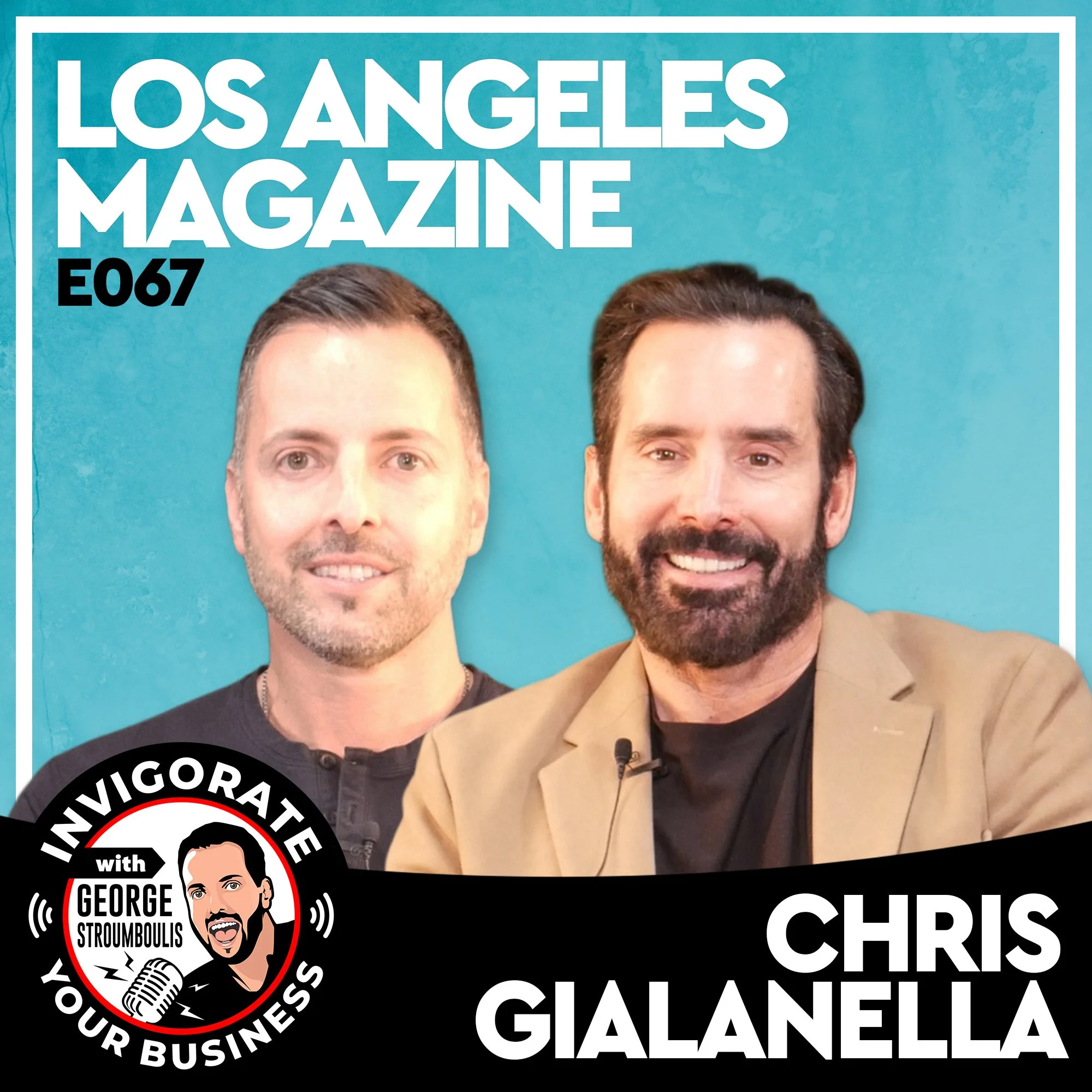
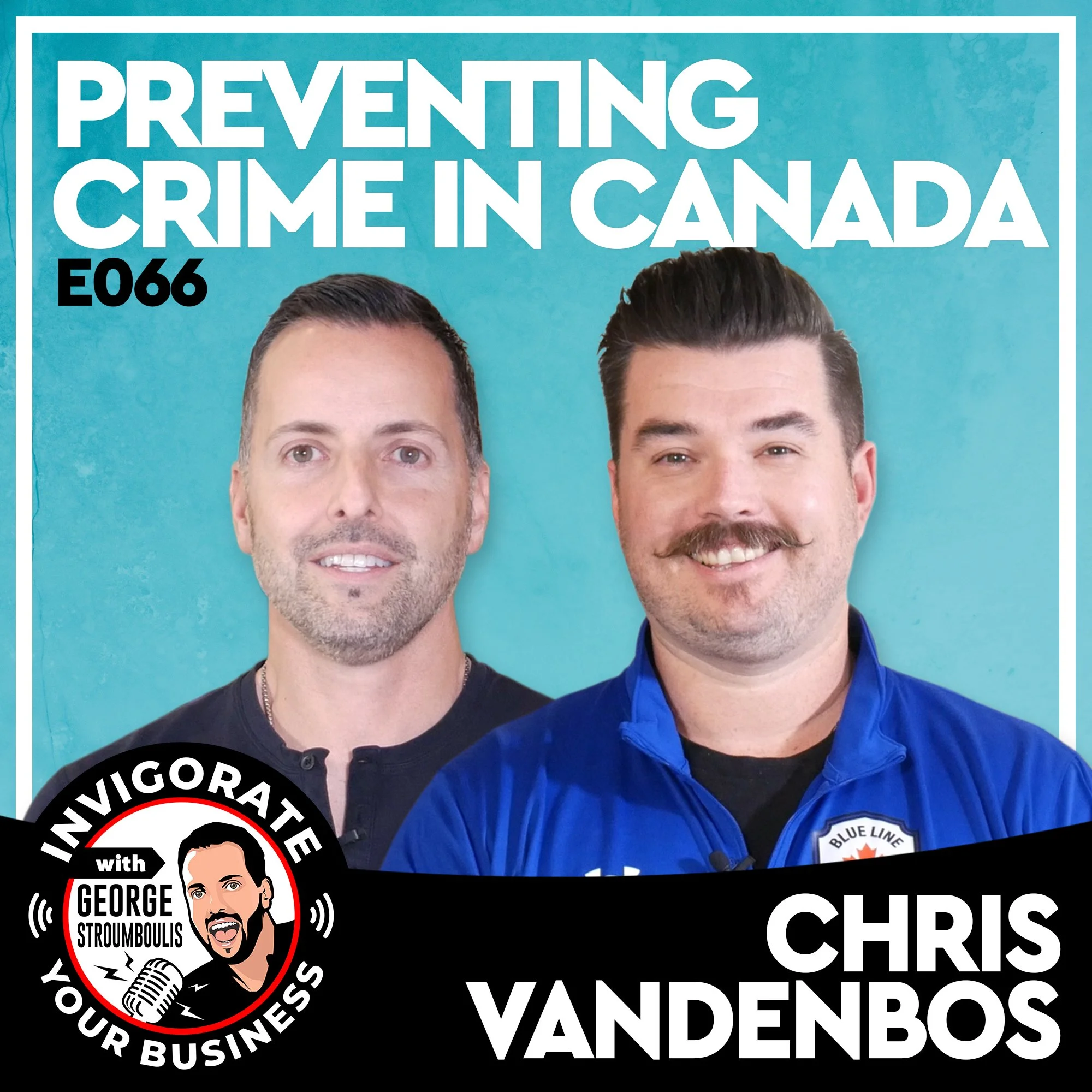
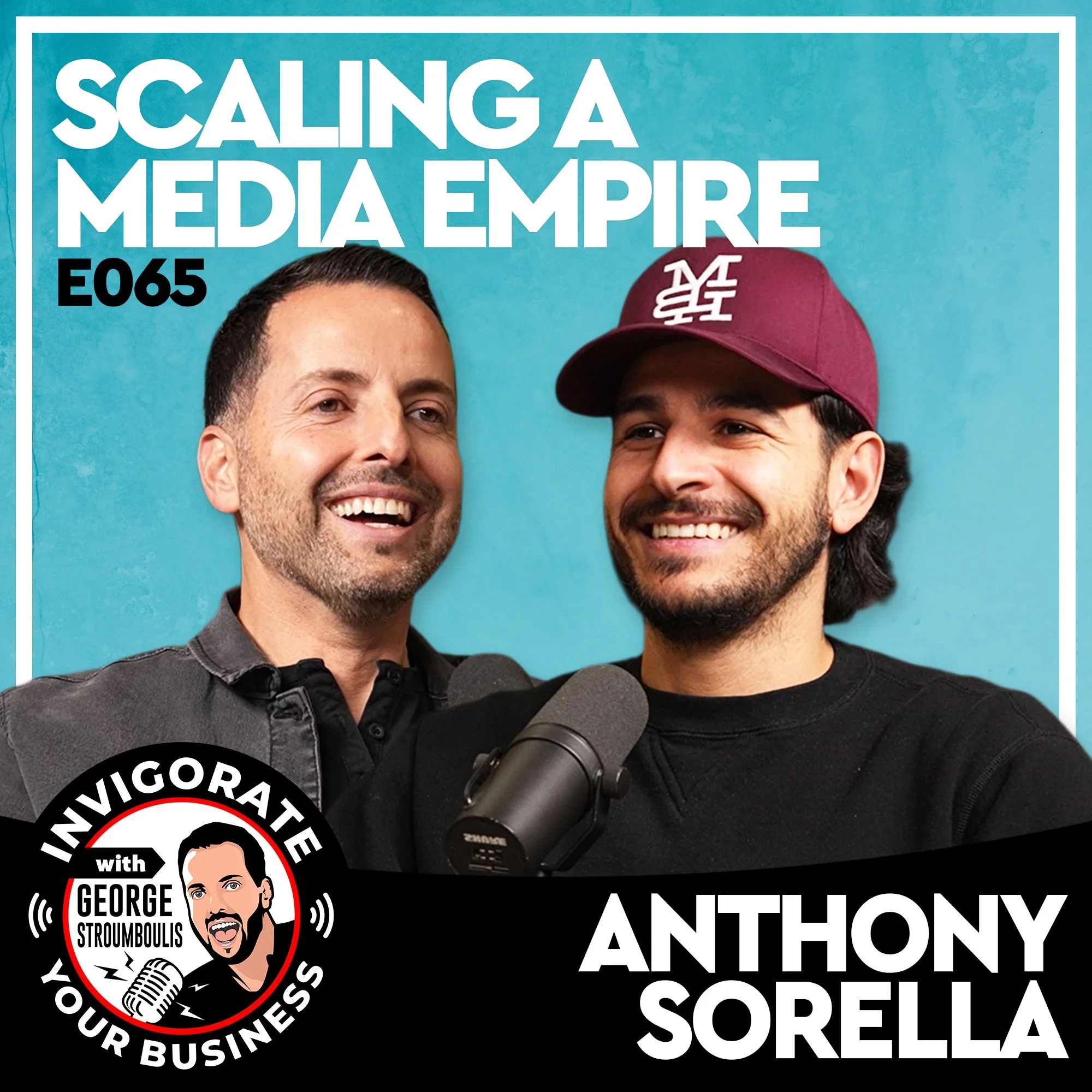
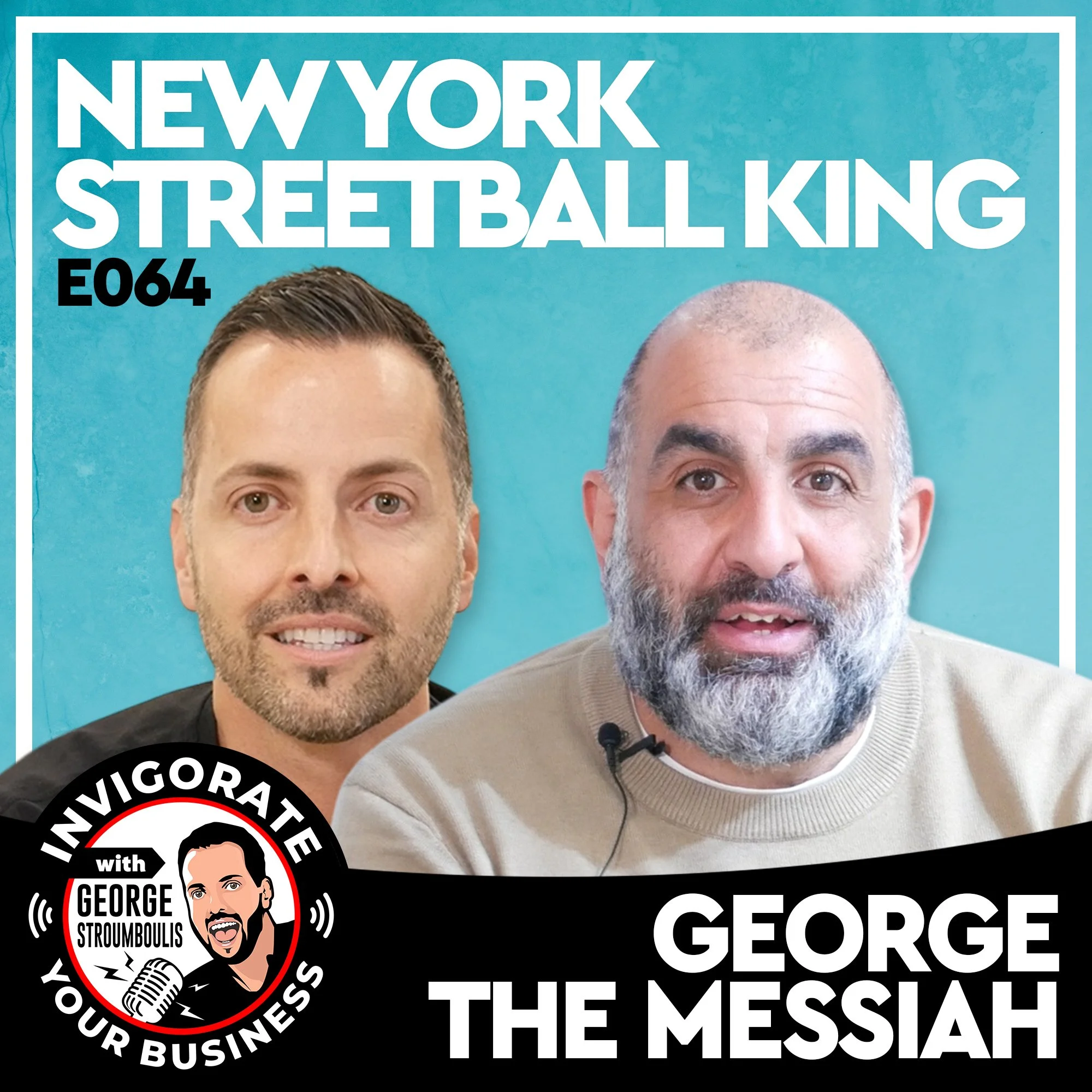
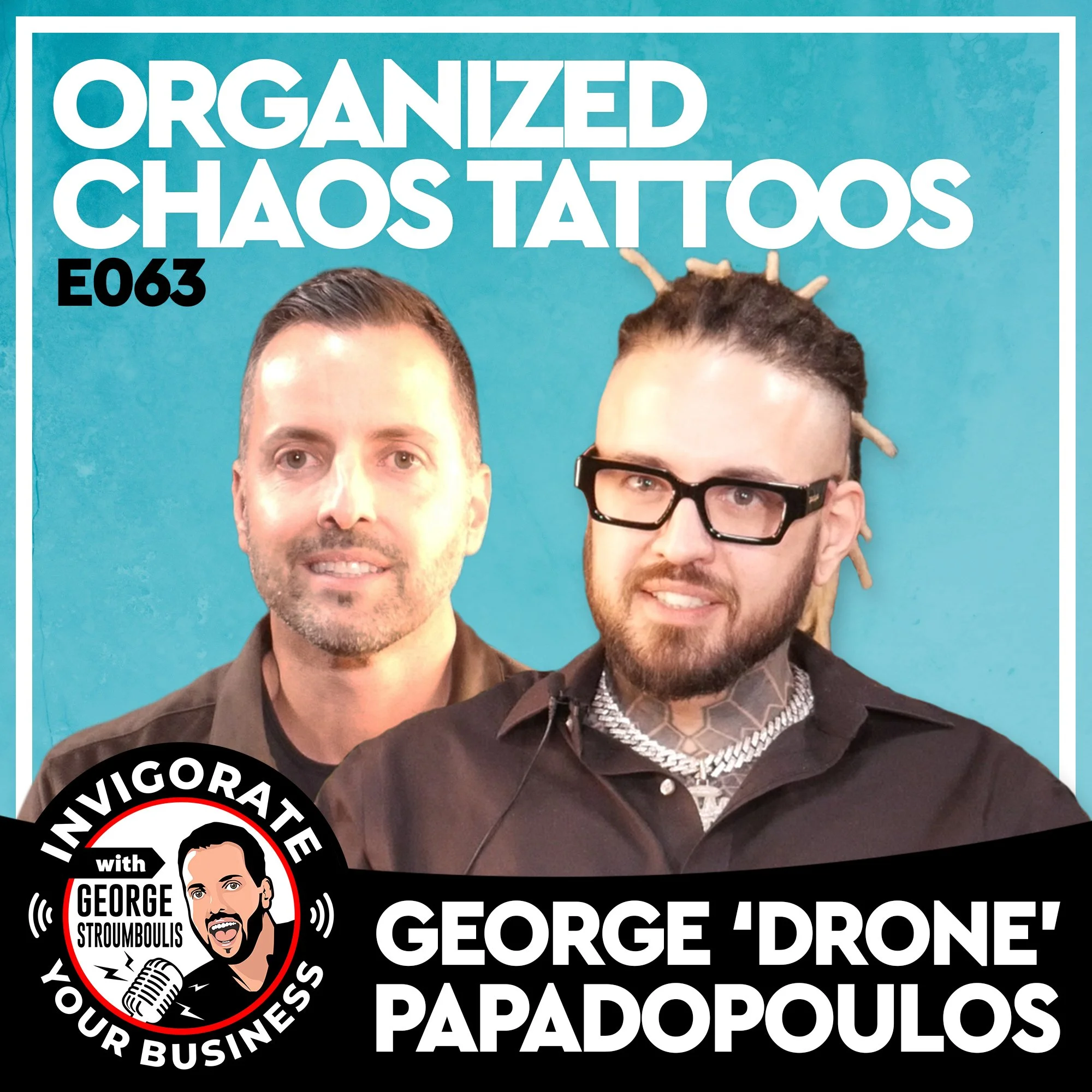

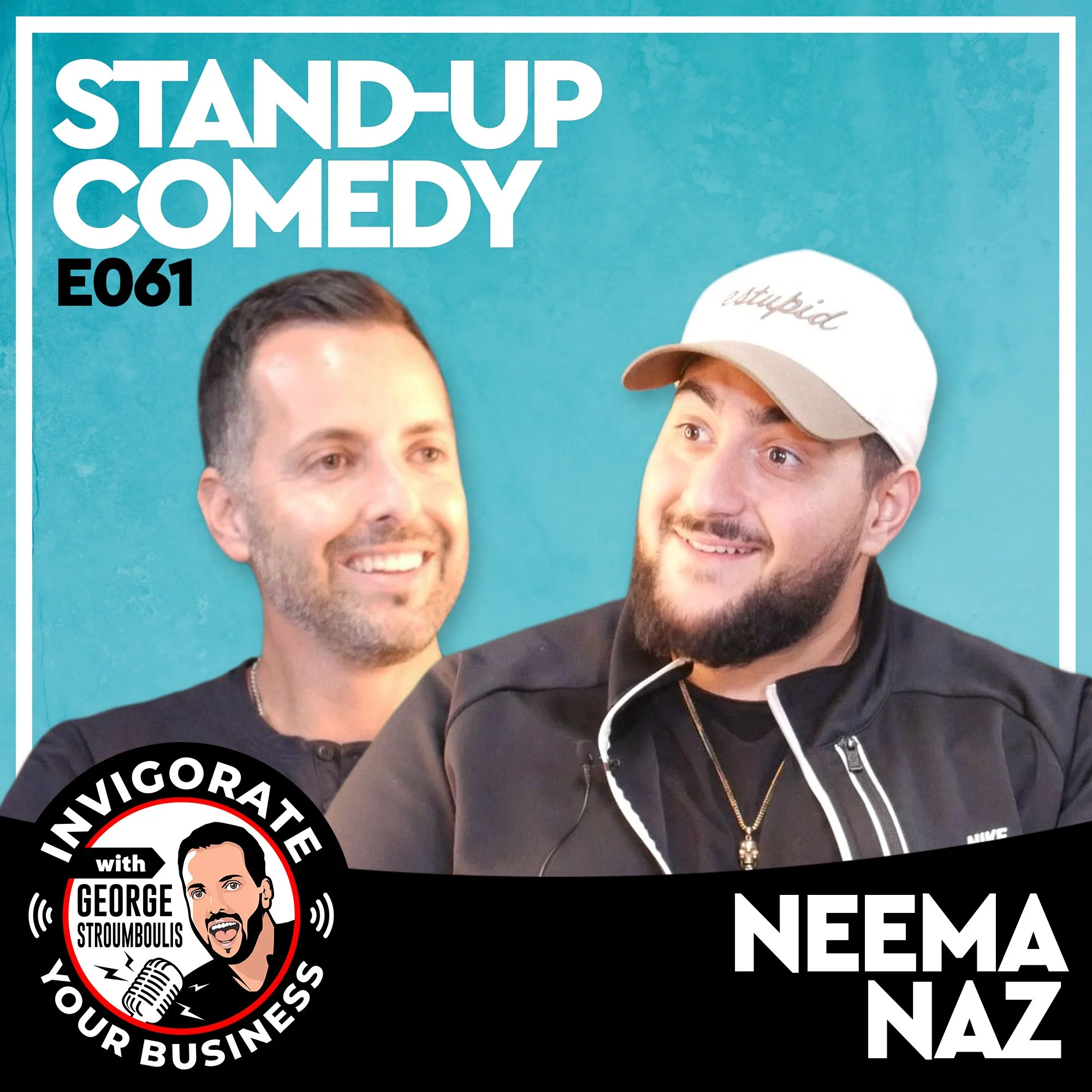
George Stroumboulis sits down with Eric Papachristos - Boston restaurateur, co-founder and CEO of A Street Hospitality, and one of the city’s most influential voices in dining and development. They dive into becoming a major force in Boston hospitality, the story behind building standout restaurant concepts, and the pressures of leading a fast-growing team.